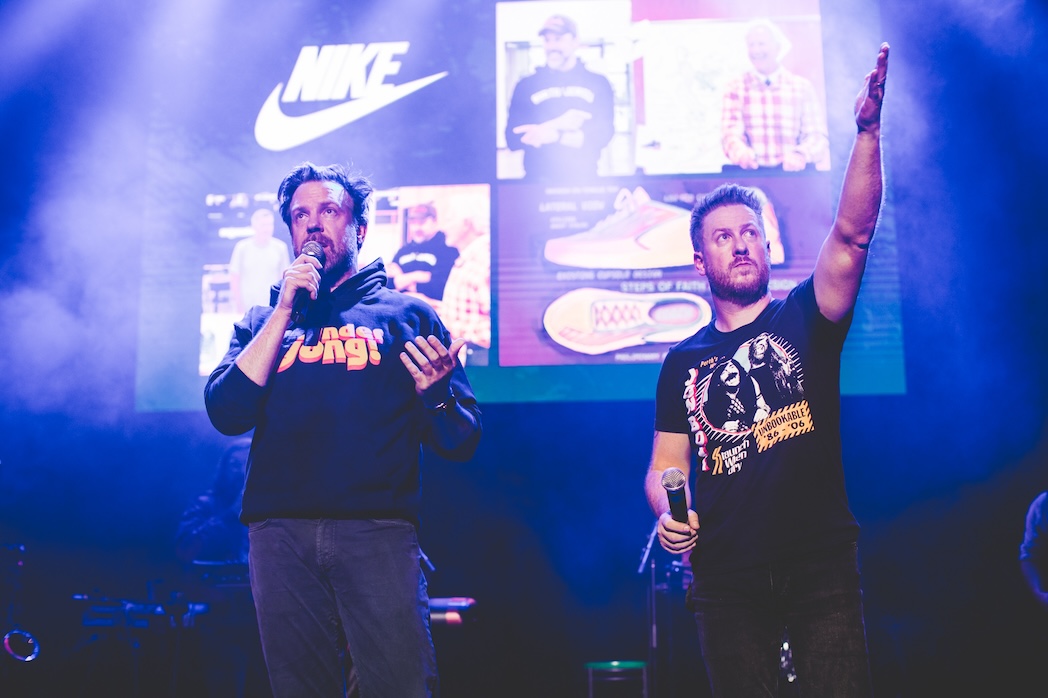Jason Sudeikis And Longtime Friend Billy Brimblecom Are About To Thundergong! Once Again

Drummer Billy Brimblecom lost his left leg to a rare form of cancer called Ewing sarcoma in 2005. After a fundraiser organized by his friends and family—including his longtime friend, actor Jason Sudeikis—he raised more than $30,000 to buy his first prosthetic limb.
Seeing the enormous financial burden prosthetics can be for amputees, Brimblecom wanted to find a way to ease the cost for other patients. With the help of Robert Pittrman, who owned the company from which Brimblecom received his prosthetic, he started the Kansas City-based Steps of Faith Foundation in 2013.
More from Spin:
- Post Malone, Shaboozey Set For CMA Awards Performances
- DANCE FEVER: Lilly Palmer
- Erick the Architect’s Love Letter To New York City
Steps of Faith is a nonprofit organization that, since its inception, has helped more than 1,200 uninsured amputees restore their mobility with state-of-the-art prosthetic limbs that range from $10,000 to $100,000.
To help cover these expenses, Brimblecom and Sudeikis started Thundergong!, a charity event held each year at the Uptown Theater in Kansas City that features Sudeikis as emcee and a host of his celebrity friends performing their favorite songs in a night that blends comedy and music to support Steps of Faith’s mission. This Saturday, November 9, Sudeikis will be hosting his 8th annual Thundergong! with the help of Will Forte, Brendan Hunt, Flavor Flav, “Weird Al” Yankovic, and others. Last year’s event raised $900,000. This year, Brimblecom and Sudeikis hope to reach $1 million.
Though the event has been sold out since August, you can still make donations to help Steps of Faith reach its goal.
I spoke with Sudeikis and Brimblecom over Zoom to discuss how Steps of Faith started, Thundergong!’s fun music performances, and how their long friendship has helped raise awareness for the amputee community.
Billy, how did you and Jason meet?
Billy: Jason and I met in the spring of 1995, and I was 18, he was 19. And we both auditioned for ComedySportz, which is an improv comedy club around the country. But we had one here in Kansas City, and we were both hired and then in the same workshop training class together. So, yeah, that’s where it all began.
And you stayed in touch all these years?
Billy: Yeah, man.
Jason: We worked together there for many moons. I moved away a couple years later to Chicago, but Billy was touring and whenever he’d come through, whenever I went back home, we’d hang out. And then cell phones became all the rage, made things a lot easier. Long-distance bills were a thing of the past. And then the internet…don’t get me going on that.
Billy: Jason actually set up my first email address for me, speaking of the internet. That’s a fact.
Jason: Didn’t know that. I forgot that.
Billy: Dude, I remember you were in town and we were at your parents’ house and you were like, “Why don’t you email?” And I was like,” I don’t email anybody.” And you’re like, “I want to email with you. I’m gonna set it up right now.” And we did it at the computer in your parents’ living room.
Billy, if you would, talk to me about the emotional journey you went through when you lost your leg.
Billy: You know, at the time, I used all four of my limbs to do my job. I was a professional drummer…but drumming was the easy part. I could barely walk, but I was on tour shortly after treatment…you sit down to play the drums so that worked out, you know? Dr. Howard Rosenthal, the man who’s my orthopedist, who diagnosed me, who helped save my life, all that kind of thing, we were doing this interview together, and he was explaining…especially since I was 28, it’s [Ewing sarcoma] rare to begin with but it’s more common for kids. The advice I was given was actually from Dr. Rosenthal’s nurse, who’s a great friend and an angel to this day, his nurse Kim Haynes. And she said, “I want to tell you that you should mourn the loss of your leg like you’ve lost a loved one.” Which seemed kind of crazy to me until it happened. And then I tried to focus on that and it’s maybe among the best advice I’ve ever been given in my whole life. If you have all four of your limbs, you use them every day for everything. When you’re born, what are the first two milestones you measure with a baby? First word and first steps, you know? And then you don’t think about taking steps or walking again until you can’t do it.
How did you start Steps of Faith?
Billy: My wife and I had been living in Nashville, Tennessee, for a few years from Kansas City and lived back here again for several years now. And we had a brand new baby. I was a touring musician. We had moved there for me to focus on the banker’s hours of being a studio musician, which I did do. But I found myself on the road a whole lot. I didn’t want to leave the house with the baby, let alone leave the city for six weeks to go on the road. Shortly after our son was born, I was at the prosthetic clinic because I had an appointment. I was getting something tweaked on my prosthetic leg, and my prosthetist said, “Hey, on your way out, will you follow me into the next room to my next appointment? There’s a guy that is being fit for the first time with a leg, and he is all healed up and he lost his leg to cancer. I think he could benefit from seeing somebody on the other side of this.” And I just really lit up and I was like, “Dude, I feel like that’s part of why this happened to me. It’s very rare that I talk to amputees and I would love to do that.” And I went in there and it was a really great, short conversation, and I could just see the kind of hope and enthusiasm in his eyes. And I left there, and again, brand new baby, emotional time, thinking about a possible career change. I was like, “Gosh, I wish that could be my job.” But I had an appointment again the next day and I told my prosthetist that, and he said, “Maybe it could be.” And then he introduced me to the guy that owned the company that was his boss. And it turns out that that guy, Rob Pittman, had established a 501(c)(3). So he basically had a tax-exempt idea, which was, when people would come to his clinic and they didn’t have health insurance and no other way to have the bureaucratic red tape to pay for this thing, just so they could get back to work and care for their family, that he would take care of them through the nonprofit. But it was sitting dormant. That’s how it came about. I was introduced to Rob and was like, “You want to talk about working again?” I always say, he tossed me the keys to a car that had no engine in it and said, “See what you can do with that.”
Jason, how did Thundergong! come about?
Jason: I would say 75%, if not more, comes from Billy’s, not only brain but also experience. He needed to raise a bunch of money really quickly in order to pay for one of these big, fancy legs. And so, myself, a few other people from ComedySportz, a few other people from the music world, put on a benefit show to raise money with comedy and music to help our buddy buy a leg. And then once these fortuitous events occurred, you know, like going in and meeting Pittman and the whole bit, Billy was like, “How do we do that, what all our friends did for me?” And so it was a pretty good format, you know? It was like comedy and music and we know plenty of people in those worlds still. It was always music-based, but I think early on it was mostly drum-focused. Which is still a great idea. And maybe we should do like for a few songs, some year…but yeah, then we were like, well, let’s put together a show that we would want to go see with people that we like and that understand why we’re doing it, and like helping people, but also like having a good time and being easy-going about it all. And try to see if we can get that done in an evening’s worth of time.
I’m curious about how you choose your music for Thundergong! In years past, you’ve performed “Handle With Care” by the Traveling Wilburys, “Dancing in the Dark” by Bruce Springsteen, and “Love Shack” by the B-52’s. What was the process of putting together your set list?
Jason: The phrase “All killer, no filler” was an early-on thing that Billy said, which I don’t think you invented, did you?
Billy: No, no, no, no.
Jason Sudeikis: But I mean, it’s like, make the mixtape that you want to listen to. And then obviously, as we invite specific artists, those of us in the comedy, in the acting realm, we get to pretend to be rock stars for an evening. People like Fred Armisen and Hannah Waddingham who actually are really talented musically and are rock stars in their own way, they’re just lending us their talent. The real rock stars—your Ben Harpers, your Winonas [Judd]—that’s thrilling. But for me, Forte, Sam Richardson, anybody that skews more actory and comedy, then we’re just trotting out things that we’ve found after hours and hours of intense, intentional karaoke…the ones [songs] that feel good to sing are ones that people sing back to you. You know? It helps.
You’ve got a good voice.
Jason: Oh, thank you. I mean when the bar is low…I don’t think I’ll be putting out a jazz album any time soon, but I appreciate it. I’ll take it.
Billy: It’s a puzzle there. There are certain songs that I’ve wanted to have in the show that we’ve not done before because we just haven’t had the right singer. It’s fun to go, what if we open the show with “Welcome to The Jungle” and Forte sang it? What if Winona sang it, you know what I mean? That’s the fun of it. It starts to come into focus way too last minute for my central nervous system, but it’s just based on who we got and who wants to do what.
Jason: You mentioned the Traveling Wilburys and “Handle With Care.” I listen to that song a couple times a year…and then to get to sing it, it’s like going back to a cul-de-sac you used to live in; nobody there is the same, but there’s a little area in the backyard of one of the places that are buried a bunch of G.I. Joe guys, if you wanted to go look. And that’s what that song feels like now.
I’ve got one last question. Last year you raised $900,000. What’s your goal for this year?
Billy: Yeah, so I’m always hesitant to say a goal, but I’m not this year. We want that million dollars, you know what I mean? But the last two years, I have been truly shocked at the number, at the end of the night. Like legitimately, two years ago I was sobbing…which felt weird to do in front of 2,500 people, but also completely appropriate given the circumstances. Last year, I just remember it was 800 something, and then a few days later, once the raffle and all of our additional fundraising was wrapping up, then we hit that 900 mark, I just was looking at it, and right as the number went up, everybody freaked out. And then Hannah turned right around and looked right at me, and I was still looking up, and then she just went up and grabbed my face. So yeah, it was wild. So it’d be great to bring in a million dollars. The need for what we do is not going away. We are helping almost double the people all year that we helped last year. And that’s just because the demand has really clicked up. So hopefully, Saturday will help us keep that going for quite some time.
To see our running list of the top 100 greatest rock stars of all time, click here.


